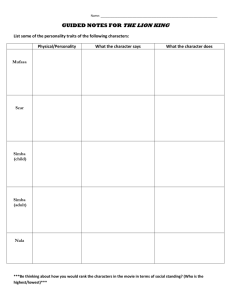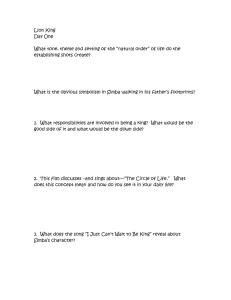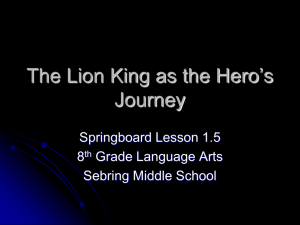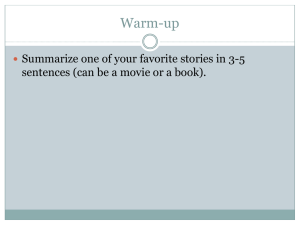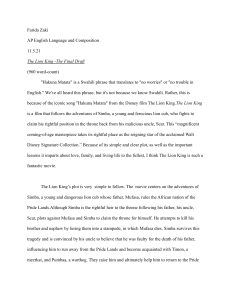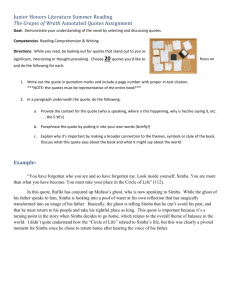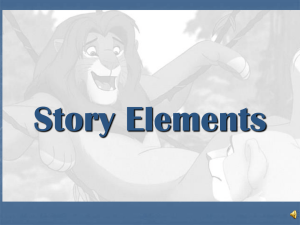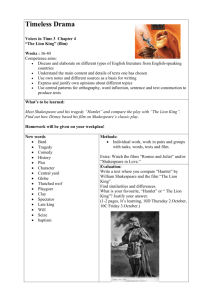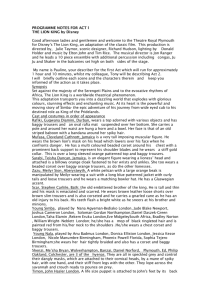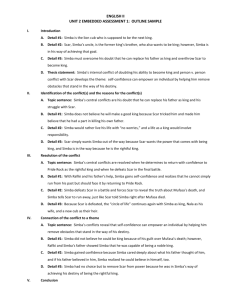The Lion King
advertisement
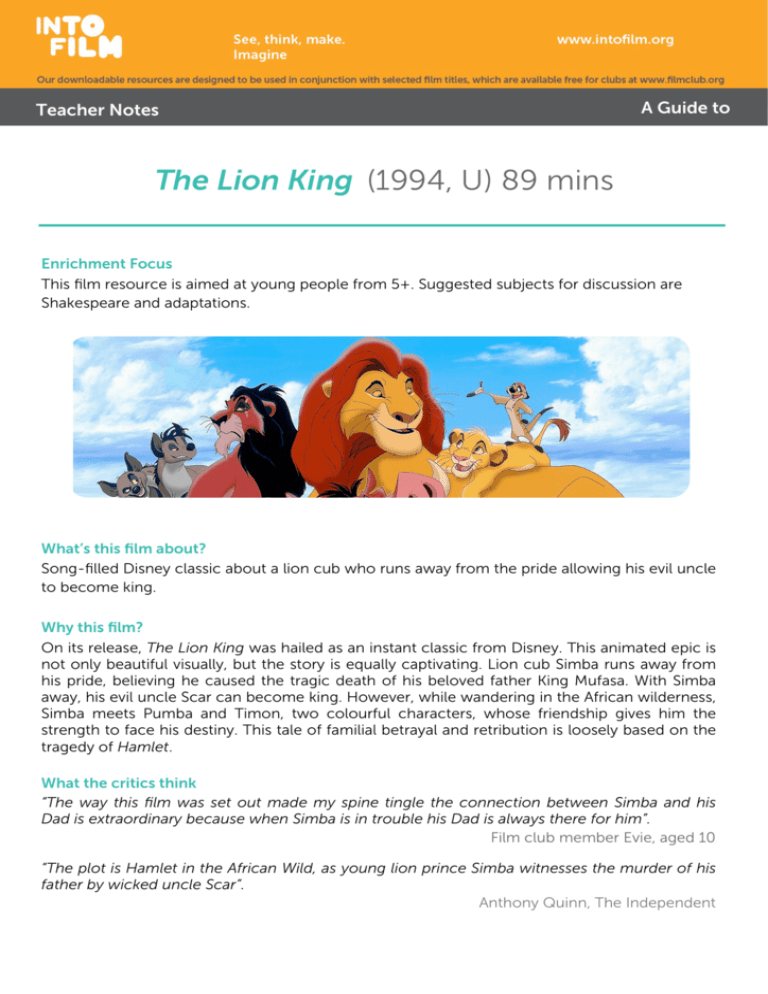
Teacher Notes A Guide to The Lion King (1994, U) 89 mins Enrichment Focus This film resource is aimed at young people from 5+. Suggested subjects for discussion are Shakespeare and adaptations. What’s this film about? Song-filled Disney classic about a lion cub who runs away from the pride allowing his evil uncle to become king. Why this film? On its release, The Lion King was hailed as an instant classic from Disney. This animated epic is not only beautiful visually, but the story is equally captivating. Lion cub Simba runs away from his pride, believing he caused the tragic death of his beloved father King Mufasa. With Simba away, his evil uncle Scar can become king. However, while wandering in the African wilderness, Simba meets Pumba and Timon, two colourful characters, whose friendship gives him the strength to face his destiny. This tale of familial betrayal and retribution is loosely based on the tragedy of Hamlet. What the critics think “The way this film was set out made my spine tingle the connection between Simba and his Dad is extraordinary because when Simba is in trouble his Dad is always there for him”. Film club member Evie, aged 10 “The plot is Hamlet in the African Wild, as young lion prince Simba witnesses the murder of his father by wicked uncle Scar”. Anthony Quinn, The Independent A Guide to Teacher Notes Before the film: Starter Activity What qualities to you think that a king should have? After the film: Discussion Questions 1. Why does Scar dislike Simba so much? 2. Why does Simba leave the Pride Lands? 3. What do you think the song ‘the Circle of Life’ means in the story? 4. William Shakespeare wrote a famous play called Hamlet about a Prince in Denmark whose father is killed by his uncle because he wants to become the King. Does this sound familiar? If you could remake a famous story as a cartoon what story would you choose, and how would you make it look different? 5. Timon and Pumba teach Simba about ‘hakuna matata’ and it stops him from being so sad. Sometimes we need to have fun and relax, but sometimes we need to be responsible and do important things: can you think of an example of a time when we need to be responsible and a time when we need to relax? Next Steps Get your students’ voices heard by starting an Into Film club at www.intofilm.org Related Resources Create your own Shakespeare Week screening of this film by using the Celebrating Shakespeare Through Film with Into Film screening Guide. Teacher Notes 1. It’s easy for the villain in a story to simply be described as ‘the baddie’, but understanding Scar’s motivations allows children to understand everything in the story a little more deeply. We never sympathise with Scar, he’s evil throughout the film, but it can be interesting to remember that Scar was going to be the next King before Simba was born. In his own way, Scar went through feelings of strong jealousy and anger, but what he did with those feelings is unforgiveable. If you feel the class are able, it’s interesting to ask them what Scar should have done instead to deal with his negative feelings. 2. Simba is the victim of a plot created by Scar. But Simba doesn’t understand the threat Scar poses, instead he believes that he is personally responsible for his father’s death. In addition, Simba is chased away by the hyenas after the death of his father (but again, he doesn’t know that the hyenas are working to Scar’s orders). 3. The film starts and ends with the same event: the birth of the next generation. Also, Mufasa explains to Simba how after they die their bodies go back into the grass and are eating by the antelope, and Rafiki teaches Simba how the spirit of Mufasa lives on inside his son, and so on. It would be possible to include discussion about lifecycles (egg to caterpillar to butterfly, frogspawn to tadpole to frog, etc.) when discussing the ‘circle of life’. 4. This can be quite difficult so give young people a list of well-known fairy tales to think about adapting. 5. Children may divide these concepts into the idea of simply being responsible at school, and relaxed at home, or responsible during class time, and relaxed during break or play time. But try to get round this by asking for two examples from home, or two examples from when they’re on holiday.
